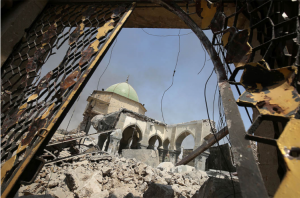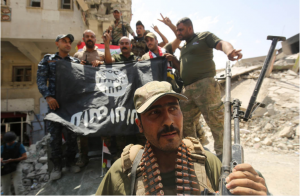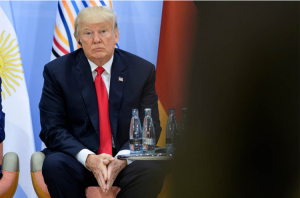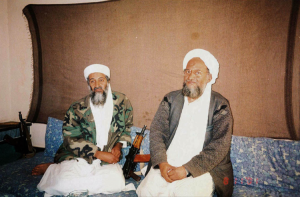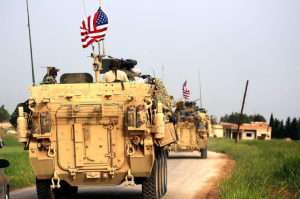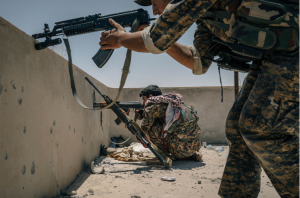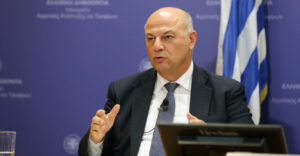The Islamic State stands on the brink of a twin defeat. Mosul, the largest city under its control, has almost entirely fallen from its grasp, and Kurdish-led forces are advancing into its de facto capital of Raqqa. Now, as the saying goes, comes the hard part. The Islamic State’s territorial setbacks have introduced new questions about the basic future of the Middle East. Foreign Policy has assembled a group of policymakers and regional experts to answer them.
The United States Can’t Retreat From the Middle East — Elliott Abrams
The War After the War — Robert Malley
The Islamic State Will Survive — Cole Bunzel
Syria’s Kurds Gamble on Washington’s Staying Power — Noah Bonsey
Syria’s Festering Wounds Will Spark a Jihadi Renaissance — Amr al-Azm
Iraq’s Power Struggles Are Just Beginning — Renad Mansour
The United States Can’t Retreat From the Middle East
By Elliott Abrams
The defeat of the Islamic State as a “state” will leave two serious questions facing the United States. The first is: Who will fill the spaces from which the jihadi group is driven? There is a clear effort by the new Iran-Hezbollah-Shiite militia-Russia coalition to reply: “We will.”
That is an answer the United States should reject. Such a development would cement an anti-American coalition in place, threaten Jordan and Israel, and leave Iran the dominant power in much of the region. To reject this challenge verbally would be a joke, however; it must be resisted on the ground, through the use of force by a coalition that must be built and led by the United States.
The conflict in Syria has destroyed any possibility of an easy formula for putting that country back together, but in the medium term, one can envision a discussion with Russia of how our interests and theirs can be accommodated while bringing the violence down to a level that allows many refugees to return home. But that discussion will achieve nothing unless American power first gains Russian respect and the Russians come to realize that compromise is necessary.
Even in the best-case scenario, with the Islamic State defeated and losing its control over a “state,” it may continue to exist as a terrorist group — and in any event al Qaeda and other jihadi groups will not disappear. So the second question is: How do we proceed against Sunni jihadis who continue to plot against the United States? It should be clear that Shiite domination of the region will help fuel these Sunni groups and assist in their recruiting at home and in distant Sunni lands. And the perception of American acquiescence or complicity in that domination will help make the United States a larger target.
All of this leads to an unwelcome conclusion — unwelcome surely in the White House and to many Americans. The defeat of the Islamic State will not end our involvement in Middle East conflicts and may in fact lead it to increase. There will be no repeat of the Iraq wars, with vast American armies on the ground, but there will need to be a long continuation of the sort of commitment we see today: perhaps 5,000 troops in Iraq, 1,000 in Syria, 1,000 to 2,000 in Jordan, and many more in the 6th Fleet and in bases in the region from which we can exert power.
As long as Iran tries to dominate the entire region and Sunni jihadi groups target the United States, the defeat of the Islamic State changes — but does not diminish — America’s stake in Middle East power politics.
Elliott Abrams is a senior fellow for Middle Eastern studies at the Council on Foreign Relations. His new book, Realism and Democracy: American Foreign Policy After the Arab Spring, will be published in September.
The War After the War
By Robert Malley
For most of the United States’ allies in the Middle East, the war against the Islamic State never was the primary concern. Even as Western nations decreed this struggle a universal priority, these nations largely humored Washington, echoed its alarm, joined its international coalition — and looked the other way. Almost from the start, their gaze was fixed on the wars after the war against the Islamic State.
For Turkey, what mattered was the fight against Kurds, and for Kurds a self-determination struggle; for Saudi Arabia and Iran, their regional contest took priority; within the Sunni Arab world, competition between the more Islamist (Qatar and Turkey) and the less so (Egypt and the United Arab Emirates) was viewed as existential; among Iraqis, a sectarian and ethnic race for post-conflict spoils had pride of place. The counter-Islamic State campaign always served as an imperfect cover for regional conflicts and contradictions. With the Islamic State increasingly in the rearview mirror, these will be laid bare.
When the dust settles, Washington will confront a Middle East struggling with familiar demons. It will also face its own familiar dilemma: How deeply should it get involved? Allies will plead for it to leap into the fray. They know Washington’s current predilections and will cater to them, dressing up raw power plays in more appealing garb. President Donald Trump’s administration is preoccupied with countering terrorism, combating Iran, and — no less important — doing whatever former President Barack Obama did not. That’s how America’s allies will frame their respective pursuits.
There is evidence already. Saudi Arabia and the UAE presented their war in Yemen as pushback against Tehran and their attempt to bring Qatar to heel as an anti-Iranian and anti-terrorist gambit. Syria’s Kurds, fearful of being jettisoned by Washington once their utility in the anti-Islamic State fight is exhausted, champion themselves as long-term bulwarks against Iranian influence and Turkish-inspired Islamism — while Ankara paints those same Kurds with a broad terrorist brush. Egypt masquerades its indiscriminate intolerance of all Islamists as a holy battle against terrorism.
All assert that the particular brand of U.S. activism they crave contrasts with Obama’s alleged passivity, which they bemoan. They know their target audience. They play to it.
The Trump administration will be tempted to take sides and take the plunge, but it would be a losing bet. The optimal way to secure U.S. interests in a post-Islamic State world is not to join or intensify conflicts over which it has little ultimate say and that would unleash the very chaos and sectarianism from which the terrorist group was born and on which it thrives. It is to de-escalate proxy wars, broker a Saudi-Qatari deal, press for an end to the Yemen war, stick to a measured stance toward political Islam, and lower tensions between Saudi Arabia and Iran — indeed, for that matter, between the United States and Iran.
That is not what America’s regional allies want. But if they truly yearn for leadership, better to lead them where the United States believes they should go than where, stubbornly and recklessly, they already are headed.
Robert Malley is the vice president for policy at the International Crisis Group and served in former President Barack Obama’s administration as special assistant to the president, senior adviser to the president for the Counter-ISIL Campaign, and White House coordinator for the Middle East, North Africa and the Gulf region.
The Islamic State Will Survive
By Cole Bunzel
How are the Islamic State’s territorial losses going to affect the landscape of transnational Sunni jihadism? Many suggest it could usher in a radical transformation: Perhaps the damage to the Islamic State’s brand will be so severe that al Qaeda reasserts itself as the uncontested leader of the jihadi movement, or perhaps the two groups set aside their differences and seek a rapprochement for the sake of keeping the flame of jihad alive.
These predictions — of an al Qaeda triumph or a jihadi merger — have been made repeatedly over the past year in light of the Islamic State’s seemingly terminal decline. Yet neither of them has begun to pan out — and there are reasons for remaining skeptical of both.
The first of these predictions relies on the assumption that al Qaeda is strong, resilient, and guided by a prudent strategy of winning over populations and subverting local conflicts to its own ends. But how accurate is this picture, really? To be sure, al Qaeda still exerts some control over a network of affiliates from North Africa to India. But it recently lost its strongest and most successful affiliate of all, Syria’s Nusra Front (known now as Hayat Tahrir al-Sham), which was seen as the epitome of this hearts-and-minds strategy.
When the Nusra Front cut ties with the mother organization back in July 2016, to many it seemed a ruse. But later it emerged that al Qaeda leader Ayman al-Zawahiri was not consulted and did not approve of what happened. This followed al Qaeda’s loss, only two years earlier, of its former affiliate in Iraq, the Islamic State of Iraq, which went on to rebrand itself and declare the caliphate. None of this speaks to a brilliant long-term strategy.
And then there are al Qaeda’s apparently declining terrorist capabilities. Zawahiri continues to insist in his numerous pronouncements that attacking the West remains his top priority. But when was the last time al Qaeda pulled off a major attack in the West or even something on the scale of the attacks in Manchester or on London Bridge? It has been years. The Islamic State remains far more capable in this regard.
The idea of a jihadi reconciliation is even more difficult to fathom than that of an al Qaeda triumph. The level of mutual animosity between the Islamic State and al Qaeda cannot be overstated. These groups and their respective followers revile each other. Al Qaeda loyalists describe Islamic State partisans as “extremists,” “Kharijites,” and “takfiris”; the Islamic State, in turn, has dubbed al Qaeda devotees as “the Jews of jihad” and loyalists of the “Sufi” leader of the heretical Taliban. This split is simply unbridgeable. It may appear to be of recent vintage but is in fact rooted in theological and strategic differences in the jihadi world that go back decades.
Jihadism, in short, will remain divided. The Islamic State, which has been around in one form or another since 2006, will almost certainly survive. So will al Qaeda. Neither will swallow the other, and neither will make amends.
Cole Bunzel is a Ph.D. candidate in the Department of Near Eastern Studies at Princeton University and the author of “From Paper State to Caliphate: The Ideology of the Islamic State.”
Syria’s Kurds Gamble on Washington’s Staying Power
By Noah Bonsey
As an American visitor in northern Syria, you get the question all the time: Will the United States eventually abandon its Kurdish friends? The answer may hinge on how President Donald Trump’s administration weighs four competing priorities: minimizing open-ended commitments abroad, repairing its strained alliance with Turkey, protecting against jihadi resurgence, and countering Iranian influence.
The U.S.-led campaign against the Islamic State relies on an unlikely partner in Syria: the People’s Protection Units (YPG), a military formation with close ties to the Kurdistan Workers’ Party (PKK), an insurgent group at war with NATO ally Turkey. The YPG dominates the U.S.-backed Syrian Democratic Forces, rules much of northern Syria, and is an indispensable partner against the Islamic State.
For the YPG, the importance of U.S. support extends far beyond the fight against jihadis. The presence of Americans deters major attacks by the powerful Turkish army and protects against pro-regime forces with which the YPG competes for territory. Should the United States withdraw from Syria, these could pose existential threats. The YPG is betting that Washington will ultimately extend its protection via political and military “guarantees,” which would help secure the substantial degree of autonomy established in areas under its control and which it promotes as a model for a future federal arrangement in Syria.
This risky gamble has persuaded the YPG to prove its utility to the United States by fighting in Raqqa and potentially beyond, progressively farther away from its Kurdish popular base. Yet, paradoxically, defeating the Islamic State in Syria would enable the United States to consider reducing its role there, leaving the YPG dangerously exposed. That option may appeal to a Trump administration keen to limit expenditure and avoid further damage to its alliance with Turkey.
Much will depend on whether the United States is prepared to extend its role past the defeat of the Islamic State in an effort to prevent jihadi resurgence. As the Islamic State’s predecessor, al Qaeda in Iraq, demonstrated so dramatically, radicals can rebound quickly if fundamental threats to stability are left unaddressed. Limiting that danger in Syria would require continued U.S. engagement focused on averting escalation between Turkey and the YPG and on promoting sustainable governance in areas the latter liberates from the Islamic State. For its part, the YPG could improve its appeal as a partner in stabilization by implementing necessary changes to its governance model.
Iran is another factor that could spur sustained cooperation. The YPG depends on transportation links controlled by Tehran’s proxies and Damascus and would likely gravitate closer toward that axis (and Russia) if the United States withdraws support. But the YPG also views growing Iranian power in northern Syria as a threat and seeks to limit the Syrian regime’s footprint there. If Washington aims to maintain leverage in Syria vis-à-vis Tehran while avoiding direct confrontation, it may see value in continuing its investment in the YPG.
Noah Bonsey is the senior analyst for Syria at the International Crisis Group, an independent conflict prevention organization.
Syria’s Festering Wounds Will Spark a Jihadi Renaissance
By Amr al-Azm
As the Islamic State loses ground, the United States and Iranian-aligned forces in Syria are likely to turn their guns on what they perceive as the gravest threat remaining — each other.
The U.S.-backed, Kurdish-dominated Syrian Democratic Forces (SDF) have steadily driven the jihadi group back in Raqqa, and previous examples indicate that the Kurds will allow the regime and its state institutions to gradually return to the city and begin providing basic services. The SDF would in turn provide the necessary security for the area. This partial handover of the city to the regime, however, is a temporary marriage of convenience.
The next critical phase will be the recapture of the strategically important city of Deir Ezzor, the last remaining major urban center under Islamic State control in Syria. The Syrian regime and its allies have been positioning themselves to move against the city and recapture it from the Islamic State, which would also bring the regime very close to the Iraqi border — an important objective of Iran, its principal ally.
This however is unlikely to sit well with the U.S. administration, which is now seeking to actively minimize Iran’s influence. The United States, however, has few options at its disposal. The elimination of the Islamic State from eastern Syria can only be achieved with the recapture of Deir Ezzor, and the SDF are unlikely to be willing to move against the city while the U.S.-allied Free Syrian Army factions in southern Syria are too weak to launch such a major offensive — leaving the regime and its allies as the only viable option. Furthermore, the Iranians have rightly assumed that the United States will not engage in a full confrontation with the regime’s forces over this matter.
Therefore, in the immediate aftermath of the Islamic State’s defeat in eastern Syria, the emerging winners will be the Syrian regime and its Iranian ally. The ongoing arrangement with the Kurds in cities like Raqqa and Manbij is temporary at best and will eventually break down, causing continued instability and uncertainty in the region.
While it is unlikely that the Islamic State will have any operational capability in Syria in the immediate aftermath of the current campaign, the ongoing challenges of partition and regional dynamics ensure that festering ethnic and sectarian tensions will continue to fuel extremism, eventually allowing the next reincarnated version of the Islamic State to re-emerge in both Syria and Iraq.
Amr al-Azm is a history professor at Ohio’s Shawnee State University and a member of the Syrian opposition.
Iraq’s Power Struggles Are Just Beginning
By Renad Mansour
To many Iraqis, the destruction of Mosul’s iconic al-Hadba minaret this month symbolized the defeat in Iraq of the so-called Islamic State. It was under this minaret, in al-Nuri Mosque, that Abu Bakr al-Baghdadi had declared his “caliphate” — and now it has been destroyed by the jihadi organization in the face of the Iraqi security forces’ advance. Yet the shape of this defeat, and the likely trajectory of a “post-Islamic State” Iraq, remains unclear.
Although its stint in state-building has ended, the Islamic State will continue to exist. A restructured organization that does not control territory represents new challenges. Militarily, the group is resorting to guerrilla warfare, including attacks against civilians in densely populated areas of Iraq. Unlike in the past, it also has plenty of resources and has shifted to mafia-esque tactics, laundering its massive cash reserves through seemingly legitimate businesses including currency exchanges and pharmaceuticals. Until recently, that also included exchanging Iraqi dinars for U.S. dollars via the Central Bank of Iraq’s currency auctions.
Underlying conflicts among Iraq’s many political forces will also come to the fore as the common cause of defeating the Islamic State recedes. Simmering disputes over land in northern Iraq are set to flare up: The leadership of Iraqi Kurdistan, Shiite Arab and Turkmen paramilitary groups affiliated with the Popular Mobilization Forces (PMF), local political leaders, Sunni Arab tribal fighters, and regional actors will compete for greater influence in critical hotspots such as Kirkuk, northern Nineveh, and the Iraqi-Syrian border area.
In Baghdad, an intra-Shiite power struggle among Prime Minister Haider al-Abadi, former Prime Minister Nouri al-Maliki, and Shiite populist cleric Muqtada al-Sadr is also set to burst out into the open. U.S. and Iranian policies are at odds here: Tehran will work to empower its trusted allies, including Maliki and senior PMF leaders such as Hadi al-Ameri, Qais Khazali, and Abu Mahdi al-Muhandis. Meanwhile, Washington is focusing on strengthening Abadi’s hand. Importantly, the Abadi-Maliki-Sadr contest is fueled by an increasingly aggrieved population that now believes corruption, not sectarianism, is the root cause of the Islamic State.
For Iraq to navigate these challenges, it must strengthen local and federal state institutions to combat the power of violent nonstate actors and reach a new understanding of local power-sharing. Only then can the state address the root causes for the rise of the Islamic State and work to translate the current military victories into long-term political settlements — and ensure that Iraq is not destined for another round of conflict.
Renad Mansour is a fellow at Chatham House, and the author of the recent paper “Iraq After the Fall of ISIS: The Struggle for the State.”
Ask me anything
Explore related questions
